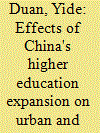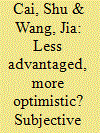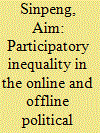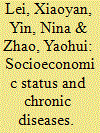|
|
|
Sort Order |
|
|
|
Items / Page
|
|
|
|
|
|
|
| Srl | Item |
| 1 |
ID:
187851


|
|
|
|
|
| Summary/Abstract |
This study examines the heterogeneous effect of higher education on intergenerational mobility of rural and urban residents before and after China's higher education expansion (CHEE). Drawing on data from seven waves of the China General Social Survey (CGSS), we find that, although the overall effect of higher education decreases on alleviating intergenerational persistence after CHEE, undergraduate or postgraduate education can still significantly promote rural intergenerational mobility in terms of occupational-socioeconomic status. However, higher education appears to have changed from assisting social mobility to advancing intergenerational persistence in urban areas after CHEE. The propensity score matching method was used to mitigate sample selection bias, and all the findings were validated by several robustness checks, including placebo and Oster's (2019) omitted-variable tests.
|
|
|
|
|
|
|
|
|
|
|
|
|
|
|
|
| 2 |
ID:
163334


|
|
|
|
|
| Summary/Abstract |
Using a recent national dataset from the China Family Panel Studies, this study provides new evidence regarding the subjective well-being puzzle across multiple indicators among rural, migrant and urban populations in contemporary China. The results show that rural people on average have higher levels of life satisfaction than do migrants or urban residents, despite their disadvantaged economic situations. The decomposition analyses reveal that subjective social status plays a substantial role in accounting for group disparities in life satisfaction, whereas objective social status and experiences of social mobility have less explanatory power. These findings suggest the importance of within-group comparison in shaping individuals' well-being in segregated societies such as China.
|
|
|
|
|
|
|
|
|
|
|
|
|
|
|
|
| 3 |
ID:
154261


|
|
|
|
|
| Summary/Abstract |
Does social media reinforce or transcend socioeconomic divides in political participation? The mobilization thesis suggests that social media use can bring previously disengaged or under-represented groups into politics. The reinforcement thesis, in contrast, posits that social media has little impact on existing patterns of political participation and can, in fact, exacerbate them. I test these two hypotheses in the context of street protests in Thailand which occurred from November 2013 through March 2014. I contrast data from the Asia Foundation’s socioeconomic survey of over 300 street demonstrators with unique socio-demographic profile data drawn from 600 Facebook users affiliated with either the anti-government People’s Democratic Reform Committee (PDRC) or the pro-government United Front for Democracy against Dictatorship (UDD). I find that overall, political participants on Facebook were of lower socioeconomic status and a younger demographic profile than offline participants for both sides of the political divide. These findings support the mobilization claim by demonstrating that there is less participatory inequality among online participants. The key implications of this study are two-fold. First, data from Thailand permits an examination of socioeconomic stratification of political participation both online and offline in a country outside the Organisation for Economic Co-operation and Development (OECD) and with profound digital inequality. Second, the similarities in the socioeconomic backgrounds of the UDD and PDRC online supporters, in stark contrast to their offline counterparts, suggest that social media engagement has a mitigating effect on participatory inequalities. Facebook thus provides a new avenue for those not engaged in offline political activities.
|
|
|
|
|
|
|
|
|
|
|
|
|
|
|
|
| 4 |
ID:
178347


|
|
|
|
|
| Summary/Abstract |
Research consistently reports a veteran mortality disadvantage relative to nonveterans, but has not considered the contribution of service-connected disability to this differential. We use data from the 1986 and 1989 National Health Interview Survey-2011 Linked Mortality Files (N = 124,122) to estimate multivariate Cox regression models of the association between veteran status and mortality, taking service-connected disability status into account. Bivariate analyses demonstrate higher mortality risk, lower socioeconomic status, and poorer health and functioning among veterans with a service-connected disability than among nonveterans and veterans without a service-connected disability. Multivariate models confirm a mortality disadvantage for all veteran service-connected disability subgroups, which is reduced by the inclusion of exogenous sociodemographic variables and substantially mediated by the health/functional limitation status measures. Results indicate that service-connected disability status accounts for some variation in, and may have a cumulative effect on, the veteran mortality disadvantage. When possible, future research should account for service-connected disability status when studying veteran–nonveteran mortality differentials.
|
|
|
|
|
|
|
|
|
|
|
|
|
|
|
|
| 5 |
ID:
110253


|
|
|
|
|
| Publication |
2012.
|
| Summary/Abstract |
China has undergone a rapid epidemiological transition from infectious to chronic diseases, a process characterized by widespread under-diagnosis of chronic diseases and low rates of treatment and control. This paper uses hypertension as an example and documents the association of socioeconomic status with various measures of this condition, i.e., prevalence, awareness, treatment and control. We find no wealth and education gradients in the prevalence of hypertension. Given education, wealth plays some roles in improving the treatment and control of hypertension. Some associations exist between education and diagnosis/treatment/control in urban areas but not in rural areas. We also find that the public health care services in China contribute little in informing patients of their hypertension status, suggesting that how to improve the effectiveness of the health care system in dealing with emerging chronic illnesses should be policy priority.
|
|
|
|
|
|
|
|
|
|
|
|
|
|
|
|
|
|
|
|
|